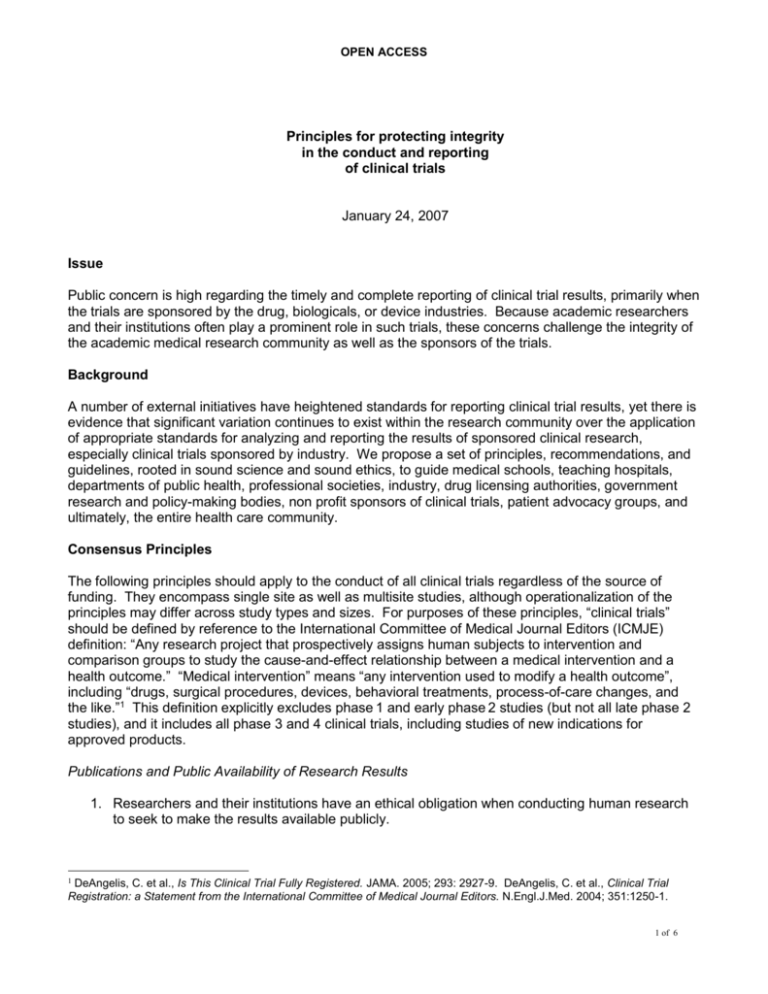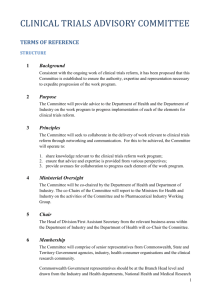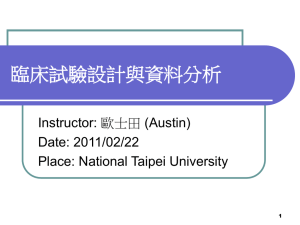Principles for Protecting Integrity in the Conduct and Reporting of
advertisement

OPEN ACCESS Principles for protecting integrity in the conduct and reporting of clinical trials January 24, 2007 Issue Public concern is high regarding the timely and complete reporting of clinical trial results, primarily when the trials are sponsored by the drug, biologicals, or device industries. Because academic researchers and their institutions often play a prominent role in such trials, these concerns challenge the integrity of the academic medical research community as well as the sponsors of the trials. Background A number of external initiatives have heightened standards for reporting clinical trial results, yet there is evidence that significant variation continues to exist within the research community over the application of appropriate standards for analyzing and reporting the results of sponsored clinical research, especially clinical trials sponsored by industry. We propose a set of principles, recommendations, and guidelines, rooted in sound science and sound ethics, to guide medical schools, teaching hospitals, departments of public health, professional societies, industry, drug licensing authorities, government research and policy-making bodies, non profit sponsors of clinical trials, patient advocacy groups, and ultimately, the entire health care community. Consensus Principles The following principles should apply to the conduct of all clinical trials regardless of the source of funding. They encompass single site as well as multisite studies, although operationalization of the principles may differ across study types and sizes. For purposes of these principles, “clinical trials” should be defined by reference to the International Committee of Medical Journal Editors (ICMJE) definition: “Any research project that prospectively assigns human subjects to intervention and comparison groups to study the cause-and-effect relationship between a medical intervention and a health outcome.” “Medical intervention” means “any intervention used to modify a health outcome”, including “drugs, surgical procedures, devices, behavioral treatments, process-of-care changes, and the like.”1 This definition explicitly excludes phase 1 and early phase 2 studies (but not all late phase 2 studies), and it includes all phase 3 and 4 clinical trials, including studies of new indications for approved products. Publications and Public Availability of Research Results 1. Researchers and their institutions have an ethical obligation when conducting human research to seek to make the results available publicly. 1 DeAngelis, C. et al., Is This Clinical Trial Fully Registered. JAMA. 2005; 293: 2927-9. DeAngelis, C. et al., Clinical Trial Registration: a Statement from the International Committee of Medical Journal Editors. N.Engl.J.Med. 2004; 351:1250-1. 1 of 6 Principles for Protecting Integrity in the Conduct and Reporting of Clinical Trials 2. Contracts between sponsors and institutions for conducting clinical trials should require a good faith effort to publish the results of such trials in a peer reviewed journals in a timely fashion. 3. Contracts for clinical trials should contain a commitment of adequate funding to cover the full costs of the analysis defined in the protocol and the costs associated with publishing the results. This principle applies even when the study is terminated for any reason prior to meeting its prespecified objectives. 4. All trials meeting the ICMJE requirements2 for registration should make their results publicly available, by means of a link to any peer reviewed publications and by posting the results in an online accessible repository, within 18 months of submission of a manuscript for publication. 5. After publication of the results, the sponsor, the investigators, and their institutions should adopt a model for public sharing of the data underlying publications (for example, one used by the NIH3) which permits exceptions for confidential or proprietary information. Registration of Clinical Trials 6. Within 21 days of initiating enrollment of participants, any clinical trial covered by these principles should be fully registered pursuant to the ICMJE requirements4 for registration. Registration must include the assignment of a unique identifying number to each clinical trial. 7. Registration should be accomplished in a national or regional registry meeting minimum quality standards and should include all the elements required by that registry. 8. Insofar as it is feasible and allowed by the register, trial registration data should be regularly updated to include a link to all published reports associated with the study. Lead Investigator and Steering Committee 9. A multisite clinical trial, at the outset, should identify a lead or principal investigator and a steering committee to represent the full body of investigators. Publication and Analysis Committee 10. A multisite clinical trial, at the outset, should establish a publication and analysis committee [hereinafter P&A committee]. It is essential that the P&A committee be independent of the sponsor’s control, have access to the full data set, understand and implement the prespecified analysis plan, and have the resources and skills both to interpret that analysis and perform additional analysis if required. In order to prevent any appearance of undue influence by the sponsor, the P&A committee should contain a majority of participating, non-sponsor-employed investigators, with appropriate skills in analysis and interpretation of clinical trials. The P&A committee and the steering committee may have the same membership. 2 Ibid. The World Health Organization is leading an international effort to provide a global portal for clinical trials registration. Because the WHO effort has not yet been launched, the WHO effort is currently acknowledged but not included as an alternative to the ICMJE registration requirements. 3 http://grants.nih.gov/grants/policy/data_sharing/. 4 See note 1. 2 Principles for Protecting Integrity in the Conduct and Reporting of Clinical Trials 11. The P&A committee in multisite clinical trials (or the principal investigator of single site studies), through a qualified expert of its choosing, preferably a member of that committee, should have the right to access any data generated during the study that the committee deems necessary to ensure the integrity and validity of the study and its full reporting. 12. The P&A committee in multisite clinical trials (or the principal investigator in single site studies) should require that the sponsor of the study perform its analysis of trial data in a defined period of time. The committee (or PI) should be able to conduct its own analysis through an expert selected by it, to the extent it deems this necessary. Whenever feasible, the expert should be agreed upon by the P&A committee and the sponsor. 13. The sponsor should share with the P&A committee all analyses called for by the study that the sponsor conducts of any biological materials it receives during the course of the study. 14. The P&A committee or PI should make a good faith effort to disseminate the results of the study through peer reviewed mechanisms. Individual Publication 15. Site-specific publications in multisite trials have an unavoidable potential for bias. Because they are almost never part of the original analytic plan, they are often misleading, and should be strongly discouraged. However, to respect an academic institution’s commitment to academic freedom, site-specific analyses should nonetheless be permitted with conditions. Accordingly, an individual site investigator in a multisite trial should be free to analyze and publish data from the individual site, consistent with sound principles of science and analysis, but only after review and comment by the P&A committee and only after publication of the study as a whole, or, in the absence of acceptance of the full publication, within 2 years from the specified end points or earlier termination of the study. Authorship 16. Ghost or guest authorship is unacceptable. Authorship implies independent, substantial, and fully disclosed participation in the study and in the preparation of the manuscript. It is acceptable for employees of the sponsor to participate in drafting and publication activity, but only if their roles are fully disclosed. 17. Institutions conducting clinical trials should adopt as policy the standards of authorship defined by the ICMJE. 18. Where applicable, investigators should use the CONSORT principles5 as guidance for publication of trial results. 19. Investigators should fully disclose, and journals should publish, the existence of all relevant financial interests, including consultancies of any investigator, in all communications of trial results. 5 Altman, D. et al., The Revised CONSORT Statement for Reporting Randomized Clinical Trials: Explanation and Elaboration. Annals of Internal Medicine. 2001; 134: 663-94. Ioannidis, J. et al., Better Reporting of Harms in Randomized Trials: An Extension of the CONSORT Statement. Annals of Internal Medicine. 2004; 141: 781-8. 3 Principles for Protecting Integrity in the Conduct and Reporting of Clinical Trials 20. Any manuscript submitted for publication should accurately disclose the role of each author in conducting the study and preparing the manuscript. Such information should also be disclosed in any public presentation of study results, to the extent practicable. 21. Manuscripts submitted for publication should disclose all previous publications involving the same protocol or database. 22. Manuscripts submitted for publication should be accompanied by the protocol and pre-specified analysis plan and all dated amendments to them, and any deviations to the pre-specified plan should be identified and discussed. 4 Principles for Protecting Integrity in the Conduct and Reporting of Clinical Trials Signatories Individuals Robert Alpern, M.D. Dean Yale University School of Medicine Michael B. Amey Associate Dean, Research Administration Johns Hopkins University School of Medicine Robert Califf, M.D. Clinical Research Institute Duke University Medical College Arthur L. Caplan, Ph.D. Chair of the Department of Medical Ethics Director, Center for Bioethics University of Pennsylvania Gail H. Cassell, Ph.D. Vice President of Infectious Diseases Eli Lilly and Company Kay Dickersin, Ph.D. Professor Johns Hopkins Bloomberg School of Public Health Robert N. Golden, M.D. Vice Dean Professor and Chair of Psychiatry The School of Medicine University of North Carolina Chapel Hill Harry B. Greenberg, M.D. Senior Associate Dean for Research Acting Co-Chairman, Department of Medicine and Microbiology and Immunology Stanford University School of Medicine and the VAPHCS Stephen I. Katz, M.D., Ph.D. Director National Institute of Arthritis and Musculoskeletal and Skin Diseases Drummond Rennie, M.D. Deputy Editor, JAMA Adjunct Professor University of California, San Francisco Robert R. Rich, M.D. Vice President and Dean School of Medicine University of Alabama at Birmingham Brian L. Strom, M.D., M.P.H. Chair and Professor Dept. of Biostatistics and Epidemiology Director Center for Clinical Epidemiology and Biostatistics University of PA School of Medicine Robert Temple, M.D. Associate Director for Medical Policy Food and Drug Administration DHHS/FDA/CDER/OMP Janet Wittes, Ph.D. President Statistics Collaborative Alastair J.J. Wood, M.D. Associate Dean Professor of Medicine Clinical Pharmacology Division Professor of Pharmacology Vanderbilt University 5 Principles for Protecting Integrity in the Conduct and Reporting of Clinical Trials Writing Committee Chairs David Korn, M.D. Senior Vice President Division of Biomedical and Health Sciences Research Association of American Medical Colleges Susan Ehringhaus, J.D. Assistant Vice President, Associate General Counsel for Regulatory Affairs Division of Biomedical and Health Sciences Research Association of American Medical Colleges Endorsing Organizations Association of American Medical Colleges American College of Epidemiology American College of Neuropsychopharmacology American Heart Association American Medical Association American Pediatric Society American Society for Bone and Mineral Research Association of Medical School Pediatric Department Chairs Calcified Tissue International Federation of American Societies for Experimental Biology Journal of Bone and Mineral Research Society for General Internal Medicine Society for Pediatric Research The BlueCrossBlueShield Association and all 38 BCBS Plans in the United States University of Alabama School of Medicine 1







